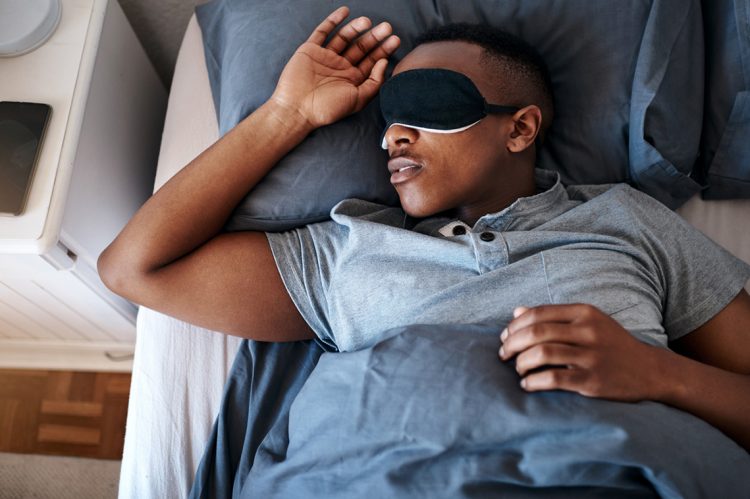Last week, we talked about M.E.D.S. (Meditation, Exercise, Diet, Sleep), keystone habits that create small wins. This week, I want to break down that last part of M.E.D.S.—Sleep—and dive deeper into how you can achieve the most restful sleep possible.
Your nightly routine is important because it’ll prepare you for everything that happens in the morning. If, for instance, you know sometimes in the middle of the night you wake up from the glow of your phone on the nightstand, put your phone in another room before you go to sleep, so the distraction isn’t possible. Recall habits guru James Clear’s tips for eliminating bad habits: Make it invisible, make it unattractive, make it difficult and make it unsatisfying.
One of the biggest components to a solid nightly routine is sleep. Break down your routine to find out where you can improve. Are you leaving the TV on while you wind down? Sleep experts say a TV can interrupt your body’s melatonin production, overstimulate your brain and generally cause poor-quality sleep. Are your pillows uncomfortable? Consider replacing them. Is your mind racing? Sometimes, even if you’re mentally ready to sleep, you’re physically not tired.
Traditional wisdom said not to exercise at night because it’ll keep you awake but a 2018 study published in Sports Medicine and referenced by Harvard Medical School in their suggestions for good sleep, found you can exercise at night, as long as it’s at least one hour before you plan to go to bed and not too rigorous. According to Harvard Medical School, the researchers found for the healthy adults who completed a low-key nightly workout, “it seemed to help them fall asleep faster and spend more time in deep sleep.”
When you exercise, you create micro-tears in our muscle tissue, which the body then must repair using its anabolic hormones like testosterone and human growth hormone (HGH). As your body does its repair, you’ll experience a deep, restorative sleep as a result of your exercise.
Another way to ensure quality sleep is to create a sleep sanctuary with house plants in your bedroom. Not only do the earthy sight and smell of plants calm the mind (and make you feel happier) but plants will also act as natural air filters, and clean air is essential for good sleep.
Here’s the backstory on plants as air filters: air contains ions (essentially atoms with electric charge). Ions with a negative charge are highly energizing, but over time, ions lose that negative charge and that’s when the air becomes stale and moldy. Introducing plants in your sleep sanctuary will recharge ions as they convert carbon dioxide into oxygen.
If you’re looking for plants to get the job done, English Ivy is a hardy evergreen perennial that the NASA Clean Air Study found to be the very best air-filtering plant because it pumps out oxygen and absorbs neurotoxins, including formaldehyde, which is common in industrial countries. Mother in law’s tongue (or a snake plant) is also resilient and easy to maintain. It doesn’t need much light, so it’s the perfect plant for a dark bedroom. Mother in law’s tongue readily converts carbon dioxide into oxygen at night, which is unique because most plants complete this process during the day.
Once you’ve got your nightly light exercise routine in place and have situated all your sleep sanctuary house plants, try to practice meditation before you go to sleep. Experts say there are about 50,000 thoughts that go through our mind every day. Meditation is one solution for calming your mind of this rampant flood of thoughts, allowing it to settle and allowing you to sleep. If you close your eyes and focus on your breathing for even 10 minutes, you can lower stress levels, blood pressure and help release endorphins that will promote high-quality sleep.
And the last step to solid sleep is darkness, which I experienced here in Vegas with blackout curtains in my hotel room. I noticed the last time I left the blinds open with all the lights of Vegas shining through my window, I woke up several times throughout the night, but when I used the blackout curtains, I had the best night’s sleep.
This concept is pretty much encoded in our DNA. As human beings, we are what’s called a diurnal species, which means we wake up and go to sleep with the rising and setting of the sun. It’s a characteristic that dates back to the early years of human history, when we were hunters and gatherers. In those years, being awake to spot predators and alert to hunt during the light hours made sense, just as it made sense to sleep under the cover of darkness. This routine continued for thousands of years—pretty much until Thomas Edison patented the first light bulb in 1879. In the grand scheme of human history, we haven’t had light bulbs for long. Even though our lifestyles have become more nocturnal with the introduction of artificial light, scientists say humans haven’t actually evolved to the point where staying up past the sunset is beneficial for our bodies.
In terms of how this impacts your sleep schedule, if you can be in a deep sleep between 10 p.m. and 2 a.m., you’ll take advantage of your body’s peak production of hormones like melatonin and human growth hormone that promote restful sleep.
So, what’s the message? A well-rested leader is a ready leader, whose mind is rejuvenated to tackle anything that comes their way. Using the simple methods above, you can improve the quality of your sleep and be at your best to lead your team.
This article is adapted from Blefari’s weekly, company-wide “Thoughts on Leadership” column from HomeServices of America.












